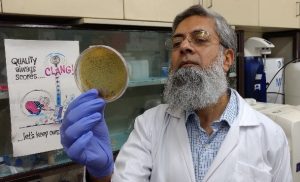

Department of Bio-Medical Engineering (DBME), IIT Ropar, Punjab.
Dr. Javed N Agrewala’s group has pioneered research in the area of ‘costimulatory molecules’ and ‘pathogen regulated receptors’ mediated regulation of immune system [J Immunol. 1994; Eur J Immunol. 1994; J Immunol. 1998; J Biol Chem. 2002; J Biol. Chem. 2007; Immunol Rev. 2006; J Infect Dis. 2015; Autophagy 2021, Autophagy 2020, Sci Rep. 2015a, 2015b, Front Immunol. 2016, 2017, 2018). His original discoveries relate to an understanding of the role of costimulatory molecules in suppressing the growth of B cell lymphomas, which was a revelation in the field of cancer. This study encouraged Biogene, a Pharma Company, to develop therapeutic antibodies against CD80 to treat patients suffering from refractory and relapsed follicular lymphomas [J Clin Oncol. 2005).
The group has made seminal contributions in the area of novel vaccination strategies against M. tuberculosis [J Infect Dis. 2004, 2010, 2011, 2014, 2015; J Proteome Res. 2008, Trends Mol Medicine 2012; J Biol Chem. 2022, Crit Rev Microbiol. 2011, 2015, 2017, Cell Mol Life Sci. 2022, ACS Infect Dis. 2021, Sci Rep. 2016; Front Microbiol. 2015; Clin Exp Immunol. 2015; J Transl Med 2017; 2018, USA Patent 2004, 2016). Recently, the group has engineered a chimeric vaccine with the help of Prof. David C. Jackson, Melbourne University, Australia that comprised of a promiscuous peptide of Mycobacterium tuberculosis [Mtb) and a TLR-2 agonist Pam2Cys. The construct induces an enduring memory T cell response and imparts better protection than BCG. Currently, the group has initiated a collaborative study with Prof Rafi Ahmed, Director, Emory Vaccine Centre, Atlanta, USA, to develop therapeutics to enhance the longevity of memory T cells.
The group explores environmental and gut microbes for human welfare. In this connection, they have discovered a novel role of ‘Caerulomycin A’ [secreted by actinomycetes) as an immunosuppressive agent by restraining the activation of T cells and increasing the survival of allogeneic skin grafts and ameliorating the symptoms associated with autoimmune diseases [United States Patent No. 8,114,895: 2012; Autoimmunity 2017; Sci Rep. 2015; J Biol Chem. 2014; PloS One 2014; Transplantation 2014). The group has elucidated in depth the mechanism of action involved in immunosuppression and suggested that Caerulomycin A enhances TGF-β-Smad3 protein signalling by suppressing IFN-γ signal transducer and activator of transcription 1 protein signalling to expand Tregs. Importantly, the technology has been developed on this immunosuppressive molecule and licensed for 3 million US dollars to Nostrum Pharma, USA. Further, the group has observed that gut microbes can contribute to preventing tuberculosis [Crit Rev Microbiol. 2014, Front Immunol. 2016, 2017, 2019a, 2019b, 2020, Eur J Immunol. 2020). Recently, the group has shown that gut microbiota can affect ageing [Gut Microbes. 2023, Aging Cell. 2023).
The group has also developed a unique vaccine targeting the addictive molecule morphine. This vaccine is composed of nanoparticles derived from the Acr1 protein of Mycobacterium tuberculosis, engineered to display both morphine and a TLR-2 ligand on their surface [Int J Biol Macromol. 2023, 2024). The formulation specifically targets dendritic cells via TLR-2 and B cells through morphine recognition [Mol Neurobiol. 2025, In Silico Pharmacol. 2025, Eur J Pharmacol. 2024). It elicits a robust immune response characterised by the generation of high-affinity anti-morphine antibodies, which effectively neutralise the addictive effects of morphine [J Neuroimmunol. 2025, J Biosci. 2023, 2025).
 Dr. Javed N. Agrewala
Dr. Javed N. Agrewala
In-charge, Immunology Laboratory
Office: R No. 120, SS Bhatnagar Block
Phone: +91-1881-242507
Email: jagrewala@iitrpr.ac.in
Research Interest: Immunology of Infectious Diseases, Vaccines, Gut Microbiome, and Immunology of drug addiction
Lab Website: https://www.iitrpr.ac.in/cbme/immunology-lab/